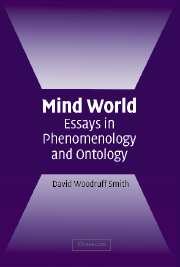Book contents
- Frontmatter
- Contents
- Prolegomena: The Terroir of Consciousness and the World
- Origins of the Essays
- Overview: A Story Line
- The Picture
- 1 Three Facets of Consciousness
- 2 The Cogito circa a.d. 2000
- 3 Return to Consciousness
- 4 Consciousness in Action
- 5 Background Ideas
- 6 Intentionality Naturalized?
- 7 Consciousness and Actuality
- 8 Basic Categories
- Coda: The Beetle in the Box
- Appendix: Background Conceptions of Ontology, Phenomenology, Philosophy of Mind, and Historical Philosophy
- Index
Prolegomena: The Terroir of Consciousness and the World
Published online by Cambridge University Press: 05 June 2012
- Frontmatter
- Contents
- Prolegomena: The Terroir of Consciousness and the World
- Origins of the Essays
- Overview: A Story Line
- The Picture
- 1 Three Facets of Consciousness
- 2 The Cogito circa a.d. 2000
- 3 Return to Consciousness
- 4 Consciousness in Action
- 5 Background Ideas
- 6 Intentionality Naturalized?
- 7 Consciousness and Actuality
- 8 Basic Categories
- Coda: The Beetle in the Box
- Appendix: Background Conceptions of Ontology, Phenomenology, Philosophy of Mind, and Historical Philosophy
- Index
Summary
This book explores the structure of consciousness and its place in the world or, inversely, the structure of the world and the place of consciousness in it. Some essays focus on phenomenological aspects of conscious experience; others on the world at large, especially the importance of basic ontological categories. Some develop ideas drawn from historical figures (e.g., Descartes, Husserl, Aristotle, Whitehead), while looking to structures of consciousness and the world. I want to put these essays between the covers of one book because, as I see them, their views work together like photos of a common field taken from different perspectives.
The ideas gathered here have evolved mostly in the terroir of California, where ideas and cultures mix uncommonly. California phenomenology. California ontology. California syncretism. Not without a sense of history (even in California).
The essays cut across the fields of phenomenology and ontology. The interdependence of ontology and phenomenology, as well as its significance for philosophy of mind, is a running theme of the collection as a whole. This interdependence I see as part of the systematic character of philosophy as a whole, a systematic unity rejected by much of twentieth century philosophy, not least in separating phenomenology from wider metaphysics (in the wake of Kantianism, positivism, pragmatism, existentialism).
- Type
- Chapter
- Information
- Mind WorldEssays in Phenomenology and Ontology, pp. ix - xviPublisher: Cambridge University PressPrint publication year: 2004



